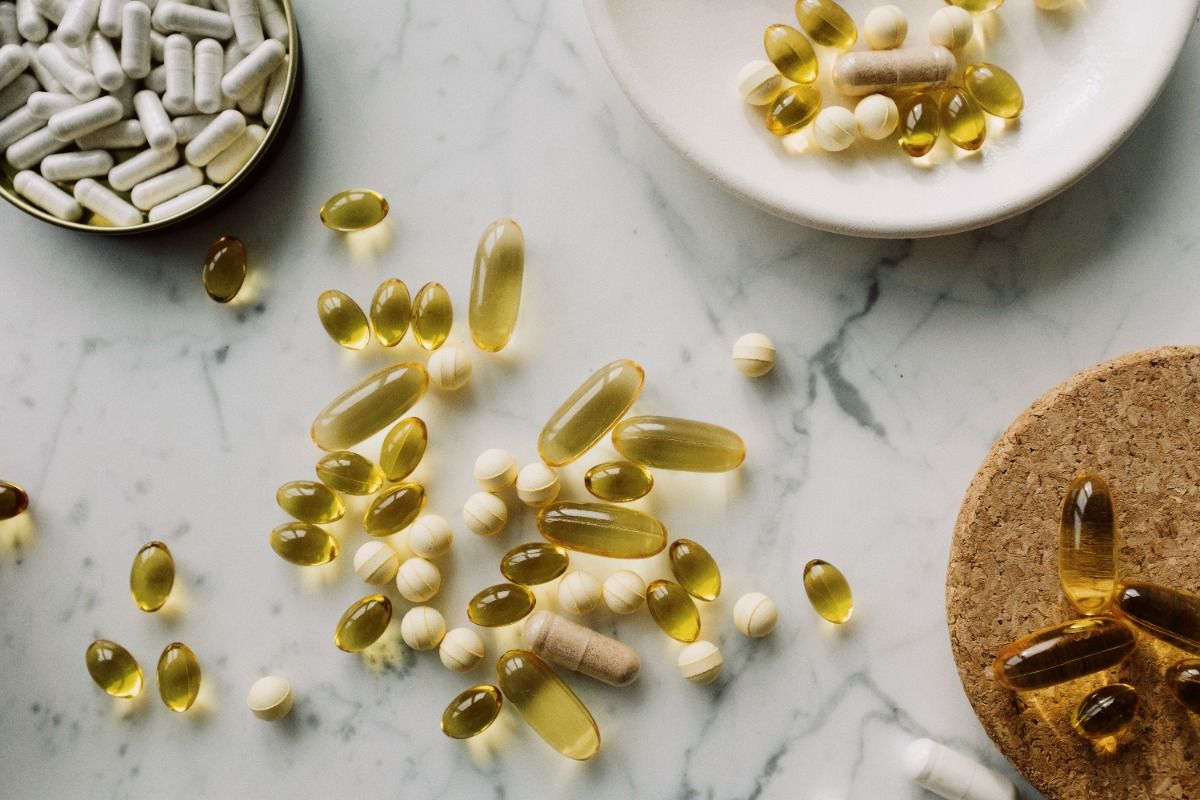
What’s the truth about how necessary supplements are for your health, and what supplements should I take? These are important questions to address with a nutritionist, doctor or naturopath because some people have nutritional deficiencies they’re unaware of. Taking an iron supplement, for example, could combat an iron deficiency which could in turn help combat your fatigue.
The vitamin supplement market in the UK reached a value of over $1.3 billion in 2021, and it’s set to continue growing in the years ahead. Every single day, countless people take everything from zinc and iron supplements, to vitamin D supplements and B vitamin supplements.
But which supplements do you actually need? The answer is simply: it depends on you. While some supplements can genuinely benefit your health and wellbeing, others might be taking up space in your bathroom cabinet for no good reason.
Let’s explore the benefits of supplements, and how you can determine which you need to take.
The Truth About Supplements: What Supplements Should I Take?
While taking supplements can improve your health when used correctly, they’re never a substitute for a balanced, healthy diet.
For the most part, the nutrients, and vitamins your body needs to thrive are available in the food you eat. Getting plenty of fresh fruit and vegetables into your diet, spending time outside to (safely) soak up the sun for vitamin D, and engaging in regular exercise will help you stay healthy.
For supplements to be effective, they need to help you “top-up” the quantity of a nutrient you might be missing in your diet.
However, if you’re already getting the right amount of vitamin or nutrient from your diet, a supplement won’t give you additional benefits. Your body can realistically only process so much of a certain vitamin before the rest is passed in your waste. If you already have plenty of vitamin C from your morning hand-squeezed orange juice, a vitamin C vitamin won’t necessarily do any good.
The best way to make sure you’re taking supplements that make a difference is to determine which kinds of vitamins and nutrients you’re not getting enough of. A DNA test from Circle DNA can help with this, so you can begin to plan a diet and supplement strategy, based on your deficiency and risk factors.

Which Supplements Have the Most Health Benefits?
Supplements can make a major difference in the health of certain individuals. For instance, multi-vitamins are helpful supplements for people with celiac and Crohn’s disease, who struggle with properly absorbing the nutrients from their diet.
People with a vitamin B12 deficiency almost always need a supplement, and adults with osteoporosis frequently benefit from supplemental vitamin D. Research even suggest exposure to extra doses of vitamin C, vitamin E, carotenoids, copper, and zinc can also reduce the progression of macular degeneration caused by age.
Outside of these specific cases where certain nutrients are needed to fight against a certain ailment, there are also vitamins and minerals which can improve general wellbeing for most people, without any risk. For instance:
1. Vitamin D
Vitamin D is essential in helping the body absorb calcium, which is crucial for bone health. Limited vitamin D intake increases your chances of getting sick, your chances of back and bone pain, and even your risk of hair loss. Technically, we should get our vitamin D each day by standing in sunlight for around 15 minutes. However, depending on where you are in the world, it can be difficult to get your allocated vitamin D requirement from sunlight alone.
The National Institutes of Health recommend adults aged 19-70 and children aged 1-13 get around 600 IU of vitamin D a day. Older adults need around 600 IU of vitamin D.
2. Magnesium
Magnesium is an essential nutrient only available from either food, or supplements. Magnesium is valuable to bone health and energy production. It can also help with sleep problems, reduce stress, regulate nerve function, and balance blood sugar levels.
A lot of people are magnesium deficient because they don’t eat enough of the right foods. Eating more spinach, pumpkin, soybeans, brown rice, or artichoke can help. Alternatively, you can look for a supplement to take you up to around 350mg of magnesium per day.
3. Calcium
If you rarely get a lot of milk and dairy products into your diet due to a lactose intolerance, or general food preferences, you might not be getting enough calcium. Calcium is necessary for strong bones and teeth, so it’s really a good idea to ensure you’re getting around 1,000mg per day.
These days, you can even find yogurts, milks, and other products “fortified” with calcium around the UK to help keep you topped up.
4.Zinc
Zinc is an important nutrient commonly overlooked by most people. It’s common to have low zinc levels if you experience a lot of stress, or you’re a little older. Zinc is valuable because it supports immune system performance, and helps your body to use other nutrients, like protein and carbohydrates.
Unfortunately, the average diet isn’t always rich in foods that offer zinc, and since your body can’t store zinc, it’s sometimes easier to simply take a supplement. You’ll need about 8-11mg of zinc per day to feel your best.
5. Iron
Iron is an important nutrient, but not everyone needs the same amount of iron. Some people have naturally lower iron levels due to deficiencies. Others have a reduced amount of diet because of their dietary choices. Vegans and vegetarians are sometimes lower in iron due to the lack of red meat in their foods.
Taking an iron supplement if you’re deficient can lead to increased energy, better brain functioning, healthy red blood cells, and more. You’ll need about 18mg of iron per day – more than that and you could end up feeling nauseous.
6. Folate
Folate is the best-known supplement to take during pregnancy. It’s excellent for supporting foetus development and protecting against birth defects. However, there are other benefits to folate too. For instance, you can combat inflammation and fight depression more effectively if you’re getting the right amount of folate.
When pregnant, it’s usually a good idea to take around 600mcg of folate per day. Everyone else can stick to around 400mcg of folate. To improve absorption, take folate on an empty stomach.
7. Vitamin B-12
B vitamins are some of the most valuable vitamins you can get into your daily diet. Every B vitamin has its own special role, and B-12 is responsible for everything from making healthy DNA, to keeping blood and cells healthy.
Some people are unfortunately more prone to B-12 deficiency than others. For instance, vegans and vegetarians don’t always get enough B-12, because the main dietary sources are in fish, meat, and eggs. The recommended amount of B-12 needed per day is less than 3 mcg, so you can look for a relatively small amount in your supplement.

Other risk-free vitamins and supplements
Aside from the vitamins and minerals above, there are a few other products you can consider taking which shouldn’t do any harm to your body, such as:
- Fish oil – which can support good heart health
- Vitamin A- which slows vision loss
- Melatonin – which can help with counteracting jet lag
Typically, however, it’s best to make sure you speak to your healthcare provider before you start taking any new supplements or vitamins. The reasons you’re taking a supplement could be linked to a specific illness or ailment that needs to be addressed. Some supplements can also interfere with other medications.
How to Take Supplements Correctly
The best way to make sure you’re taking the right supplements safely is to learn as much as you can about your current deficiencies, and risk factors. The more you know about the nutrients you’re already getting, the easier it is to decide which supplements you need to take. Aside from doing your genetic research, make sure you:
- Speak to your doctor: Discuss your supplement options with a healthcare provider and address any symptoms which might be worrying you before beginning supplementation.
- Do your research: Learn as much as you can about the recommended daily requirement for vitamins and minerals, so you don’t consume too much. Research the quality of the supplement provider you choose too.
- Read the label: Read all multi-vitamin and supplement labels to ensure there are no drug interactions to worry about.
Be wary of any extreme claims that a supplement will give you incredible energy, fat-burning powers or a bullet-proof immune system too. These claims are often a sign of supplements that aren’t always up to scratch.
Nothing Beats a Good Diet
Finally, while some people genuinely can benefit from a supplement in their routine, the majority of us can get the nutrients and vitamins we need more effectively from a proper diet. Find out your optimal diet type based on your genetics with the CircleDNA testing kit. No matter your goal when taking supplements, a nutrient-dense and healthy diet will always be more effective.
Remember, supplements are supposed to be “supplementary”. This means they can enhance the benefits already delivered by your well-rounded diet. Supplements generally shouldn’t be used in place of real food unless you’re unable to get a specific food into your diet. Keep in mind that when you use whole foods to get nutrients, you’re also getting extra vitamins, fibres, and additional substances you won’t get in supplement form.







Comments are closed.